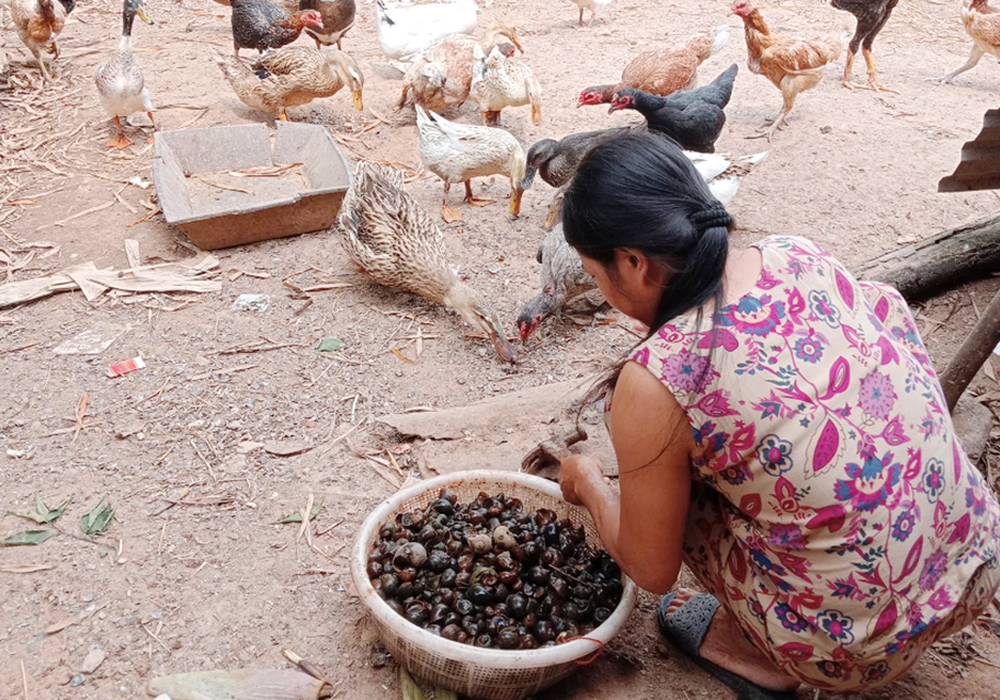
Ho Chi (real name withheld), a survivor of human trafficking, feeds poultry at her garden in Vietnam's Quang Tri province. Nuns have given her financial and emotional support to rebuild her life. (Joachim Pham)
Editor's note: This story contains sensitive subject matter involving human trafficking, rape and violence.
Just at the age of 15 in 2018, Ho Chi was tricked into getting a well-paying job in trading clothes from neighboring China, and she was sold to a Chinese farmer who was 34 years older than her.
The Van Kieu ethnic woman from Vietnam's central province of Quang Tri was forced to toil on tea farms and do the housework for years by the man and his mother in China's Guangdong province.
Chi had to eat leftovers after their meals and was raped by the man.
"I failed to escape from them at night many times and consequently was beaten unconscious," she said, adding that she endured the painful humiliation, hoping that one day she would break free from their grasp.
The Christian woman, who has three younger siblings, said their mother left them after divorcing their father, so she dropped out of school when she was in ninth grade to work to support the family.
Chi (whose name has been changed to protect her privacy) said she was not rescued from hell on earth until December 2023, after she secretly asked a tea merchant who speaks Vietnamese to report her case to Chinese authorities. As a result, she was sent back to her home in January.
She said her memories of the harrowing experiences in China now continue to weigh heavily on her mind, and she often struggles to find restful sleep at night.
National Vietnam Television reported that government authorities cracked a staggering 1,744 cases of human trafficking involving over 3,000 defendants and supported nearly 8,000 victims from 2012 to Feb. 15, 2023.
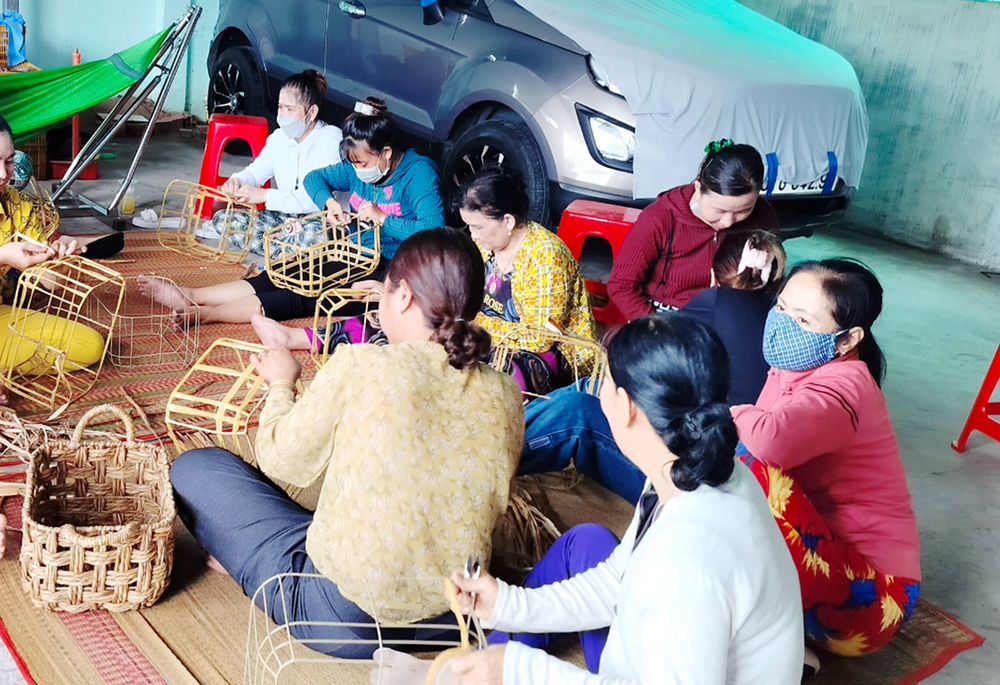
Survivors of human trafficking and other women make bamboo and rattan products for a living at a church-run house Apr. 24, 2023, in Vietnam's Quang Tri province. (Joachim Pham)
The Southeast Asian country also saw an increase in the number of survivors of trafficking year by year. Authorities reportedly recorded 254 victims of trafficking in the first eight months of 2023, compared to 222 in the previous year.
Victims are reportedly enticed to work in foreign countries or marry foreigners, and then trafficked and coerced into online scams, forms of modern slavery, forced marriage, sexual exploitation or drug smuggling. Some have their organs harvested, while others are threatened to pay money for their release. Some individuals with disabilities are exploited for begging or subjected to chemical, drug or weapon testing.
"It is extremely generous of local sisters to offer me comfort, vocational training and emotional and material support to help heal my wounds," Chi told GSR while sitting on the ground in her leaf house.
She raises poultry and makes brooms and woven baskets from bamboo and rattan to earn more income.
Chi, now 21 years old, said she is six months pregnant by the Chinese man.
"I plan to leave my child in the care of the nuns and work for a bamboo and rattan products cooperative in the area for a living," she said.
Daughters of Our Lady of the Visitation Sr. Mary Madeleine Trinh Thi Huong from Cam Lo Convent in Quang Tri province, which shares its border with Laos, said many local women are sold to foreigners in Laos and China, where they are coerced into the harrowing realms of the sex trade or various forms of forced labor. Some are sold off as brides to Chinese men, who subject them to unfair treatment.
Huong said her four-member community brings up four children whose Van Kieu ethnic mothers are trafficking survivors rescued from Laos and China. The mothers, ages 17-25, leave their children in the nuns' care as a way to steer clear of being disrespected by their neighbors. Their children live with orphans at the convent.
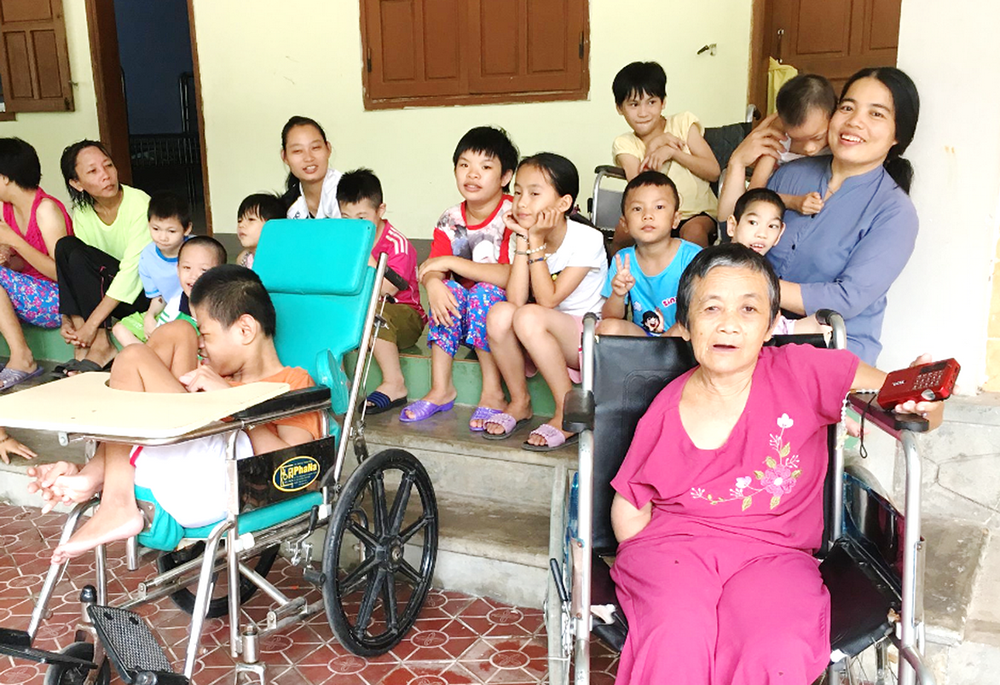
Sr. Mary Madeleine Trinh Thi Huong (right), orphans, pregnant women and older adults pose for a group photo at her convent May 13, 2023, in Quang Tri province. (Joachim Pham)
The deputy of the community said they also provide free accommodation and vocational skills for three other pregnant women of human trafficking at the convent. The survivors will be given financial support to give birth at local hospitals.
"They live together with other pregnant women who are abandoned by their romantic partners so that they can empathize with one another's experiences, offer mutual support and collectively heal their wounds and reclaim their sense of worth," she told GSR.
They assist the nuns in cooking, tending to orphans' needs, cleaning the house, cultivating vegetables and honing their skills in embroidery and sewing.
Huong said two survivors who are appreciative of the nuns' aid were baptized during Easter in March.
She said local people, including ethnic communities, face several challenges. The lack of access to education and job opportunities, coupled with poverty, has made them vulnerable to human traffickers, who lure them with high-paying jobs in Laos and China, making it difficult for them to resist the temptation.
She said creating sustainable employment opportunities for them is crucial for preventing human trafficking.
"Without stable jobs, they feel compelled to seek work elsewhere in order to support themselves and their families, making them vulnerable to exploitation," she said.
She said enhancing efforts to combat human trafficking extends beyond rescuing and assisting victims. It encompasses amplifying awareness and establishing avenues for employment, education and sustainable livelihoods among vulnerable people.
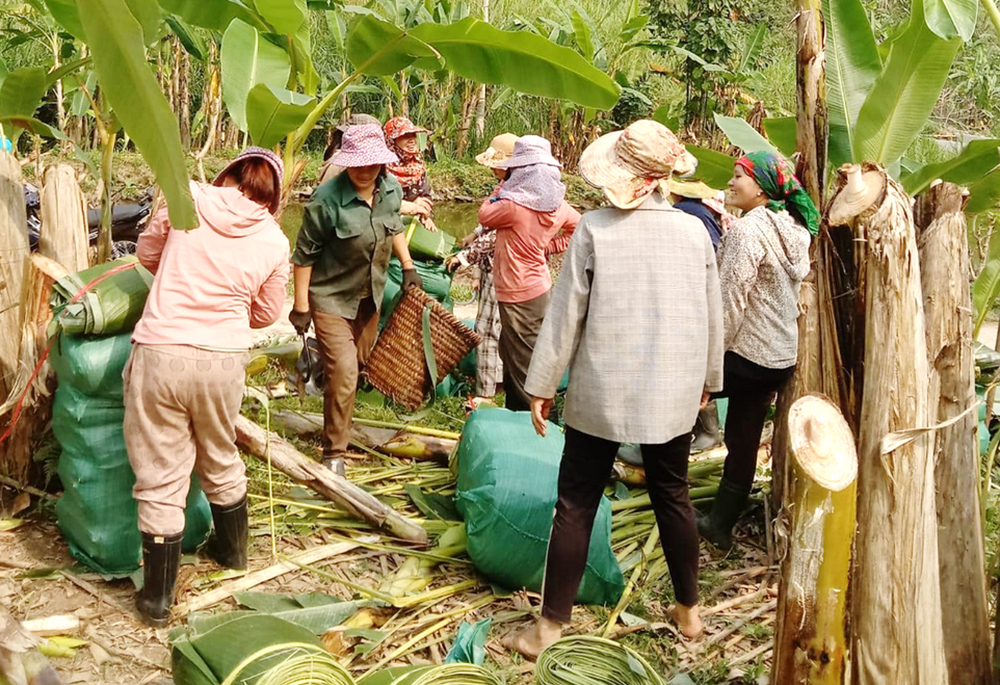
Van Kieu ethnic women collect banana leaves on their farms to sell at markets for a living on May 4, 2023, in Quang Tri province. Vulnerable women can become targets for human traffickers. (Joachim Pham)
The nuns furnish some unemployed youths with funds and vocational training in sewing clothes, making shoes, bamboo products and traditional handcrafts to enable them to generate income for themselves at home.
Patients and victims of natural disasters are also assisted with essential provisions of health care and food to ensure their well-being and stability at home and curb their migration to urban areas in search of livelihoods.
Missionaries of Charity Association Sr. Maria Elizabeth Tran Thi Dieu from Ha Tinh province said many people are easily drawn to false promises of decent jobs overseas since they witness other workers sending remittances back home and enabling their families to clear all their debts, construct large houses and invest in properties.
However, Dieu noted, many victims find themselves without stable employment abroad and tragically falling prey to migrant smugglers.
In 2019, Ha Tinh province recorded about 35,000 people working illicitly in foreign countries.
Locals reportedly seek employment in England, Australia, Russia, South Korea, Japan, Taiwan, Thailand and other countries, where they engage in agriculture, garment manufacturing, mining and construction.
Some are compelled to cultivate cannabis illegally and toil in contaminated environments, which seriously deteriorates their health before being sent back home. Others have vanished without a trace, leaving their families at home desperate.
Some die in work accidents, and their families are left to repatriate their bodies for burial, taking a heavy toll on already vulnerable households.
Dieu said survivors endure the physical and emotional trauma of their experience and face the daunting challenge of rebuilding their lives afterward as they are unable to repay debts they have borrowed to cover their fake documents and journeys.
Advertisement
She said the tragic incident of 39 Vietnamese migrants suffocating in a refrigerated truck in Essex, England, in 2019, as they attempted to enter the country unlawfully continues to horrify local people.
The victims, ages 15-44, included 10 from Ha Tinh, 21 from the neighboring province of Nghe An, and the rest from four other provinces.
Among them, the parents of 26-year-old Pham Thi Tra My, hailing from Can Loc district of Ha Tinh province, reportedly had to pay $21,000 for her illegal journey to England.
"The families of some victims are still struggling with debt and suffering the bitter anguish of their loved ones' death," Dieu said.
She said the association members from the provinces of Ha Tinh, Nghe An and Quang Binh "extend our condolences to the families of the victims, offering heartfelt prayers for the souls of those in Catholic communities." They also call on benefactors to donate to the victims' families to help with their financial burdens.
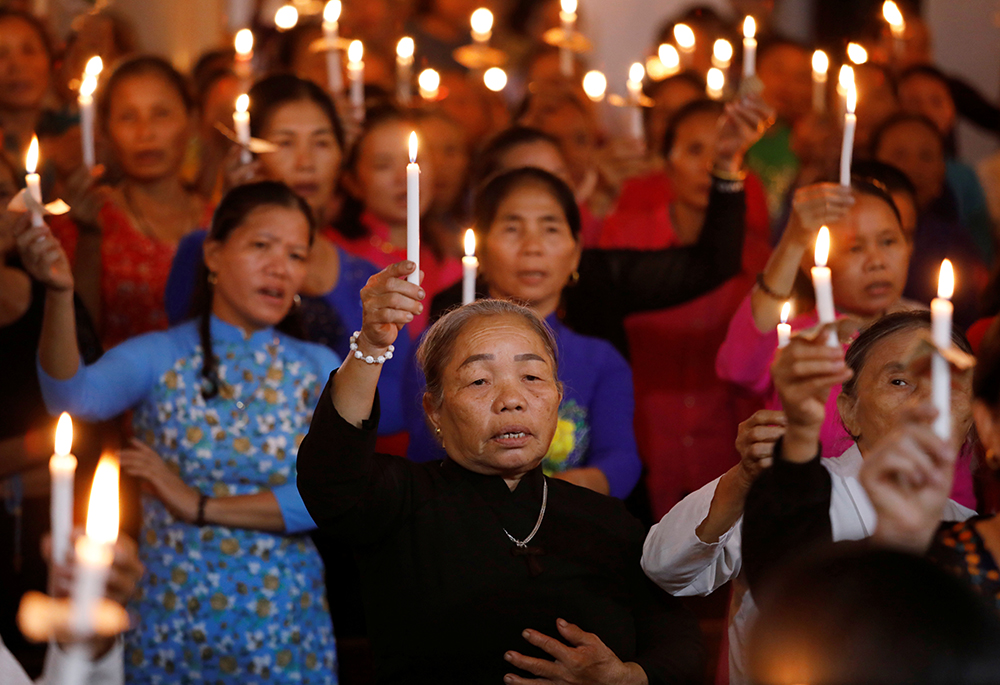
Women hold candles at a church Oct. 26, 2019, in My Khanh, Vietnam. The service was for 39 people found dead in the back of a truck at the Port of Tilbury Oct. 23, in Essex, England. (CNS/Reuters/Kham)
The nun, whose community with four members is based in Can Loc district, said the sisters are dedicated to equipping catechism students and couples preparing for marriage at parishes with problem-solving skills to shield them from human traffickers and smugglers.
"We teach them that working illegally abroad is a sin against the Catholic conscience and a violation of secular law. This perspective can encourage people to make informed, ethical choices regarding employment opportunities abroad," she said.
She said local youths also join volunteer groups to support victims of migrant smuggling and those whose loved ones have fallen victim to deception and trafficking abroad.
She said they now grant financial aid to 17 survivors of human trafficking and smuggling to cover their medical treatment, raise pigs and poultry, and catch fish for a living.
"We are delighted that many Catholics hold their family values and dignity in high regard, choosing not to seek employment opportunities overseas," she said.
Chi said she brought upon herself the suffering and humiliation solely based on the enticing words of traffickers. She wished she had sought advice from the nuns and steered clear of slave labor in China.
"I am deeply indebted to the nuns for their help. Now I am trying to lick my wounds and rebuild my life."






